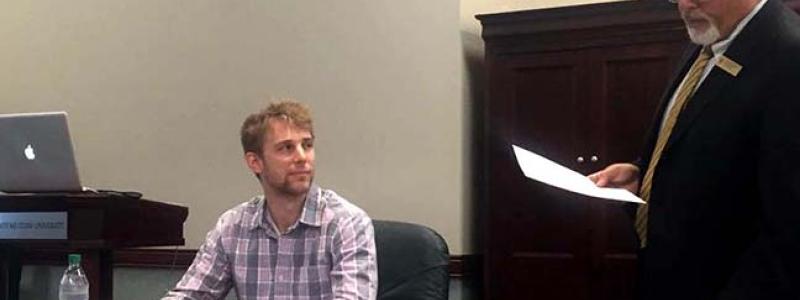A Langley high school teacher is heading back to the classroom this fall with a master’s degree no one else has, as well as research findings that will allow him to help some particularly vulnerable students: boys with behavioural and social issues.
Brendan Kwiatkowski is the first graduate of Trinity Western University’s MA in Educational Studies, Special Education.
“Teachers tend to be less confident in teaching those students,” he said. But Kwiatkowski has observed that more and more, mainstream classrooms have special-needs students with IEPs, or individualized education plans.
As Kwiatkowski was teaching at a Langley public high school, he took a particular interest in the boys who struggled with emotional issues.
“Research from all around the world, including B.C., shows that students with behavioural needs are the least accepted students out of any special needs category by teachers,” said Kwiatkowski. So in an effort to help them, and with some administrative support, he began an intervention course that turned into the basis for his thesis research.
As Kwiatkowski worked with the boys in his study, and they shared their stories with one another, he developed a foundational understanding of why they might “blow up” at school.
An excerpt from Kwiatkowski’s thesis abstract reads, “The consequences of societal pressures for males to be emotionally stoic, dominant, aggressive, and to avoid association with traits more aligned with the feminine, can be linked to a number of problematic social and emotional behaviours.”
“How masculinity is represented can be harmful,” Kwiatkowski explained. “It helped me build empathy for those students who are marginalized, and it will help me be an advocate for them.”
Kwiatkowski’s research has also informed some of his teaching practices.
First, he’ll continue the intervention group he started, but with a different group of boys. “There is a strong desire from adolescent males themselves to take part in this type of group,” he says.
He also hopes to affect the way his students think about masculinity through his own behaviour. “I hope that in my role as a teacher I can model for students, perhaps more specifically males, what it’s like to be emotionally intelligent in a way that is healthy and seen to come from a place of strength.”
Additionally, he’ll continue to avoid shame-based and confrontational classroom management practices, including talking to students after class instead of in front of the group, and not assuming a student is at fault because of his reputation.
Kwiatkowski has received positive feedback when he’s allowed students to take a “cooling off” walk during class, and he’ll continue to do this as well.
Dr. Allyson Jule, Kwiatkowski’s thesis supervisor, the co-director of TWU’s Gender Studies Institute, noted that educational research focused on masculinity rather than femininity in B.C. high schools is rare.
“Brendan’s results point to some needed work on the part of teachers to consider how we limit students by deeply held sexist attitudes and beliefs about how children learn and grow,” she said. “His work challenges the notion that ‘boys will be boys’ and, rather, points to the ways we make boys the way we want them to be. Stubborn stereotypes of boys as rough and tough make it difficult for boys to be any other way in today’s schools.”

